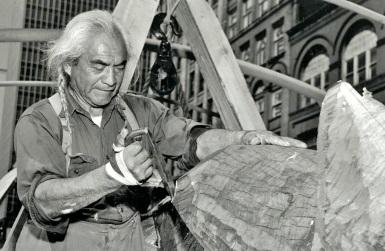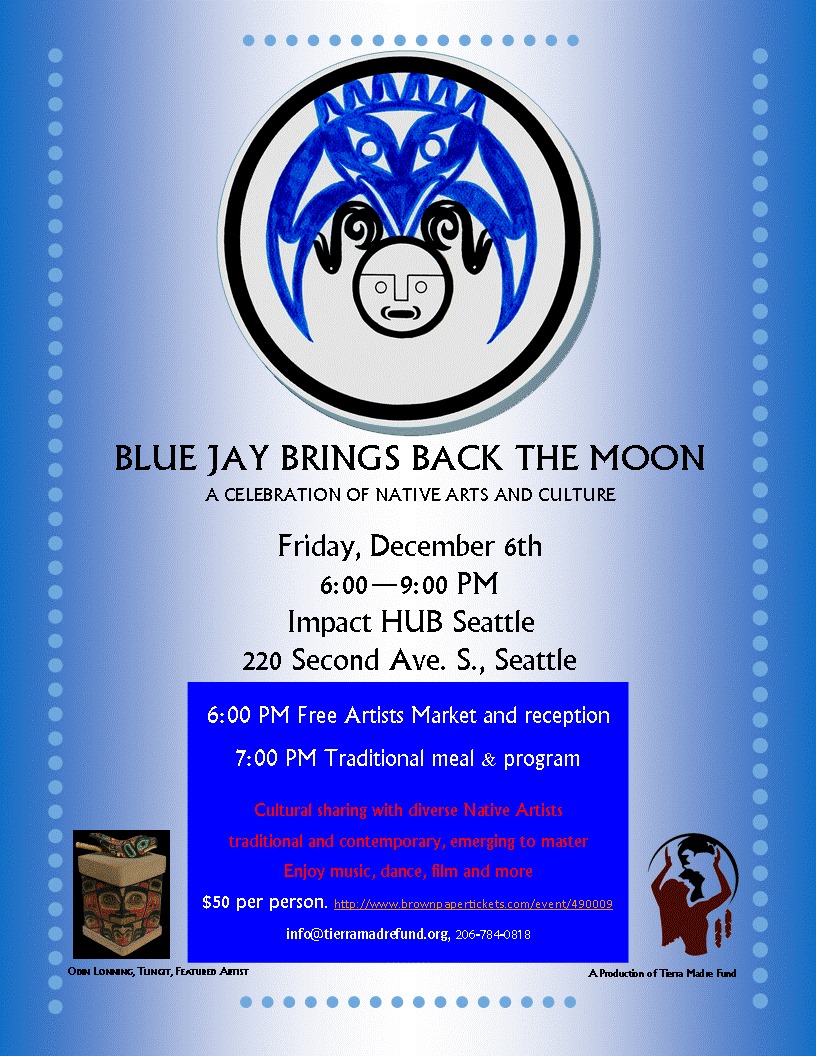Lushootseed Family nights
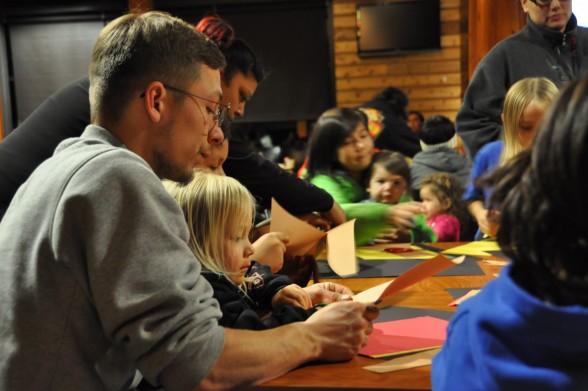
By Monica Brown, Tulalip News Writer
Lushootseed Family Nights are back for the next eight weeks and the language department is inviting anyone with the desire to learn the Lushootseed language to attend. This season’s first meeting took place at the Tulalip administration building on Wednesday, Nov 20th and was organized to gaing ideas from students for the upcoming activities and lessons.
“We call ourselves language warriors and anyone who comes to help out is a language warrior too,” said Natosha Gobin during Wednesday’s family night. Family night events have been taking place since the early 90’s and are gaining momentum as more children and adults become dedicated to learning the language.
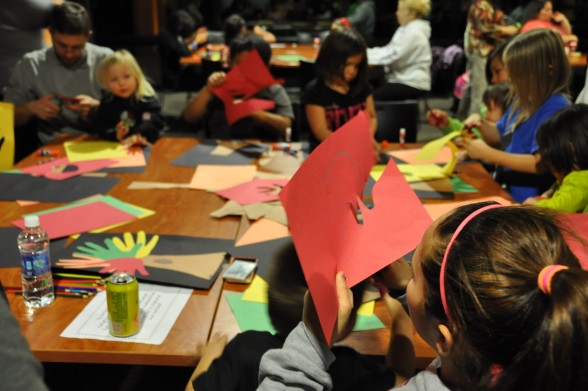
Lessons teach basic phrases, words, songs and prayers that can be used in everyday conversations. All lessons and materials are provided at no charge and are open to anyone interested in attending. At the first two meetings, dinner is provided by the department but the following meetings will be potluck dinners. Future Family Nights will be held at Tulalip Hibulb on Wednesdays from 5:00pm to 7:00pm, regular attendance is not required.
Fall Lushootseed Family Nights Schedule
November 20, 27
December 4, 11, 18
January 8, 15, 22, 29
Tulalip Hibulb Cultural Center is located at 6410 23rd Ave NE, Tulalip, WA 98271. For more information, please contact: Natosha Gobin ngobin@tulaliptribes-.gov 360-716-4499.
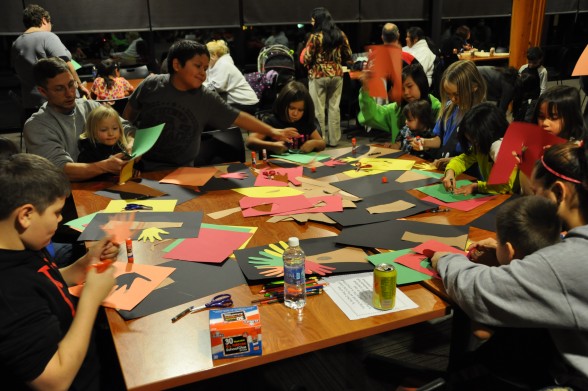
A Totem Pole History: the Work of Lummi Carver Joe Hillaire
Burke Museum, Burke Room
Wed., Dec. 4, 2013 | 7 – 9 pm
$5 at the door. Free to Burke Museum members.
Join Editor Gregory Fields, Coast Salish carver Felix Soloman (Lummi/Haida), and pigment and paint specialist, Melonie Ancheta, for a richly illustrated discussion of the life and influence of Joseph Hillaire who is recognized as one of the great Coast Salish artists, carvers, and tradition-bearers of the twentieth century.
Prof. Fields will introduce the book, “A Totem Pole History: the Work of Lummi Carver Joe Hillaire,” along with the songs and stories recorded by Hillaire and his daughter, Pauline. Contemporary carver Felix Solomon, noted for his work in the revitalization and perpetuation of Coast Salish Lummi carving, will also present.
A Totem Pole History: the Work of Lummi Carver Joe Hillaire
The book includes chapters by Felix Soloman, Bill Holm, Barbara Brotherton, Skokomish artist and scholar CHiXapkaid Michael Pavel, Melonie Ancheta, and others. In addition to the book, a media companion (a DVD and two audio CDs) titled “Coast Salish Totem Poles” will be available and includes Lummi stories, songs, and an illustrated presentation of Pauline Hillaire interpreting several of her father’s major totem poles.
Doors open at 6:30 pm. $5 at the door. Free to Burke Museum members.
Sweat Lodge Homicides Remorse: James Arthur Ray Says He Was Arrogant
Source: Indian Country Today Media Network
James Arthur Ray, the purported self-help guru who led a “Spiritual Warrior” weekend retreat outside Sedona, Arizona in October 2009 at the tune of nearly copy0,000 per participant that claimed three lives and hospitalized 18, is still remorseful, he told CNN’s Piers Morgan on Monday, November 25, months after his July 12, 2013, state prison release.
RELATED: James Arthur Ray Found Guilty of Negligent Homicide
Two Years for James Arhur Ray, Is It Enough?
Self-Help Shamster Behind Sweat-Lodge Homicides Released From Prison
“If I could trade places with any of the three, James, Kirby or Liz, I would do it,” Ray said.
Ray was found guilty of three counts of negligent homicide on June 20, 2011, and was sentenced to two years—concurrent sentences for each of the deaths. He was required to fulfill at least 85 percent of the term (20 months) and was ordered to pay $57,000 in restitution to the victims’ families
During the CNN interview, the 56-year-old author and former entrepreneur expressed anguish over his leadership of a sweat lodge ceremony that killed 38-year-old Kirby Brown of Westtown, New York, 40-year old James Shore of Milwaukee, and 49-year-old Lizbeth Marie Neuman of Prior Lake, Minnesota.
“I think the most difficult thing I can ever imagine is investing your entire life in helping people, and then finding them getting hurt,” Ray told Morgan. “It’s just the antithesis of anything that I had ever stood for or wanted. And so that anguish has continued every single day since that moment.”
According to prosecutors, participants in Ray’s spiritual retreat suffered dehydration and heatstroke at the hands of Ray’s urging them to remain in the sweltering sweat lodge without food or water for hours on end. Participants testified that they were told they would symbolically die and then be reborn in the sweat lodge ritual, CNN reported, and that Ray scolded them to overcome their weakness and stay inside. The 18 people who were hospitalized endured burns, respiratory arrest, kidney failure, loss of consciousness and dehydration. Several witnesses recounted people collapsing, vomiting, violently shaking and experiencing delusions. They contended Ray heard and ignored the concerns.
“Was I arrogant? Yes. I have that characteristic, I can be arrogant,” Ray told CNN’s Morgan. “And I think there’s a lot of hubris that comes in my former business. You know, people flying all over the world and asking me how to have a better life,” he said. “It tends to go to your head. You know? You tend to think you’ve got all the answers, and so you get humbled.”
Under his sentence, Ray is not barred from conducting self-help seminars or sweat lodge ceremonies. Family members of the victims have promised to monitor Ray should he try to reestablish his empire, CNN reported, but Ray says he has no intentions of trying to salvage his self-help business.
Read more at http://indiancountrytodaymedianetwork.com/2013/11/26/james-arthur-ray-admits-arrogance-expresses-anguish-sweat-lodge-homicides-152448
Lucille Echohawk to Hold Holiday Family Fundraiser in Nation’s Capital
By Rob Caprioccioso, Indian Country Today Media Network
Lucille Echohawk, executive director of the Denver Indian Family Resource Center (DIFRC), found herself this holiday season needing to be in Washington, D.C. for a board meeting of the National Museum of the American Indian, so she decided to turn the trip into a chance to do good for vulnerable Native children and their families.
“My travel was already paid for, so I couldn’t resist using the visit to D.C. to help raise awareness of our cause and to raise some funds for our work,” Echohawk said. “I’m very excited to rub shoulders with some old friends and to meet many new ones.”
Echohawk, a Pawnee Nation citizen and longtime Indian and tribal advocate, has been director of the DFIRC for about a year now. The organization was founded in early 2000 as a child welfare agency focused on meeting the needs of Indian children and families in the Denver area.
RELATED: Lucille Echohawk’s ‘Big Vision’: To Strengthen Communication Between Denver and Tribes
Echohawk said the goal of DFIRC is to assist families to avoid involvement with the child welfare system and to support and advocate for families already involved by offering services that build up the strength of Indian families. She said, too, that it provides assistance for other organizations who would like to do the same.
“Our practice model is in place for anyone who needs to use it,” said Echohawk, who added that she is so grateful to be able to be helping others. She’s long been committed to doing so, but it took on a renewed meaning for her after a scary experience last year when she was doing a water aerobics class at the local YMCA and her heart stopped. Since her recovery, those who are close to her say she has been even more enthusiastic and happy in both her life and work.
Still, there are challenges. Being the director of the non-profit organization in times of dwindling private and federal support requires constant outreach and fundraising, said Echohawk, who formerly worked several years for Casey Family Programs as a senior Indian Child Welfare Act specialist and strategic advisor.
“It’s a lot of work, especially in this funding climate, but we are doing it for the children and families who need the most help,” she said.
But she is not deterred. Having worked in D.C. in the 1970s and having many family members who have been involved in the world of politics – including the retired Assistant Secretary—Indian Affairs Larry Echo Hawk at the Department of the Interior – she started listing names of folks she knows in Washington. She soon had an impressive list of invitees—some of whom turned out to want to help out as hosts and donors. LaDonna Harris soon helped make some connections, and fellow women warriors, like Kimberly Craven, Shannon Finley, and Rebecca Adamson were quick to follow suit, with longtime Indian advocate Ed Gabriel signing on to be committee chair. Invites have since gone out to many Indian-focused officials across Washington.
“Everyone has been so nice in helping out,” Echohawk said, noting this is the first time the organization has held an event of this nature outside of the Denver metropolitan area. “It shows how committed they are to caring for Indian children and youth.”
The reception, which Echohawk hopes will attract at least 50 guests with a suggested donation of $200, will be held at Bobby Van’s Steakhouse in downtown D.C. on December 2. To those who may be interested in attending, she suggested they contact staffer Diane Waters at dwaters@difrc.org.
Besides offering the opportunity to connect with Echohawk and friends, the event will feature a silent auction with the chance to purchase artwork by Navajo artist Pabilta Abeyta, Taos designer and Project Runway finalist Patricia Michaels, Pawnee/Ojibwe artist Raymond Nordwall, Crow artist Kevin Red Star, and Pawnee/Yakama Artist Bunky Echo-Hawk.
For those who can’t be in Washington for the event but who would like to help out, Echohawk pointed out that the organization is accepting donations through Colorado Gives. That effort is called the 7th Generation Campaign and is intended to increase understanding and support of Native families as they deal with today’s complex challenges and prepare for tomorrow.
“It would be nice to see a lot of goodwill at this time of year,” Echohawk said. “What a better holiday gift than to help Native children and families?”
Read more at http://indiancountrytodaymedianetwork.com/2013/11/27/lucille-echohawk-hold-holiday-family-fundraiser-nations-capital-152452
‘Small Business Saturday’ returns Nov. 30

— image credit: Amy Wadkins
Every day is about a small business when you own one.
That point is clear to people like Brent Emory, owner of E&E Lumber and Home Center. The business has been at 1364 State Ave. in Marysville for more than 40 years.
“We’re open every day,” Emory said. “We’re doing something every day, every month, and we’re having fun on a day-to-day basis.”
The business offers military and senior discounts, as well as 20 percent off all in-store merchandise on the first Saturday of every month. This year, Emory is again planning to be part of Small Business Saturday, set for Nov. 30.
“It’s a great concept,” he said. “We are recognizing it and participating however we can.”
Small Business Saturday was started three years ago by American Express to promote local stores across the country. It asks people to shop locally the Saturday after Thanksgiving to celebrate and rally behind small businesses.
Marysville’s small businesses make up 90 percent of its business community and “serve as the heart and soul of the city,” according to Caldie Rogers, president and CEO of the Greater Marysville Tulalip Chamber of Commerce.
“They work long hours, provide local jobs, generate city revenue for the services our residents need, and donate their time and their money to our local non-profits, putting the quality of life in our way of life,” Rogers said.
The Greater Marysville Tulalip Chamber of Commerce is urging all residents to shop Marysville on Small Business Saturday, added Rogers.
The Arlington-Smokey Point Chamber of Commerce is also asking people to shop locally on Nov. 30, said Chamber President Kristen Granroth. A day like Small Business Saturday encourages people to discover products and services that are available locally, and the hope is those new customers will turn into repeat customers, she said.
“If one person goes downtown to buy something and sees another business where they might be able to get products or services, it’s a success in my book,” Granroth said. “Shopping locally all year long is our go-to message. It only benefits all of us; our schools, our lifestyles, our businesses.”
At least 20 businesses are new to the Arlington-Smokey Point Chamber this year, according to Granroth. At 212 members, the chamber has hit its highest membership total yet. Chamber Business After Hours events occur once a month and have helped business owners better support one another, Granroth said.
David Boulton, owner of Flowers By George at 335 N. Olympic Ave., participates along with other Arlington business owners in Super Saturdays, where customers receive discounts on purchases made on the first Saturday of every month. He and others have blue doormats they put outside to encourage people to shop small. His doormat will definitely be out on Nov. 30, Boulton said.
“It’s our tax dollars staying in the community,” he said. “I’m looking forward to it, and I’m hoping it will be a good Saturday.”
Boulton, who is a second-generation owner of his business, promoted last year’s Small Business Saturday through the Flowers By George Facebook page. He’s noticed TV ads promoting the day this year, and believes those will help to generate more interest in the event.
“I don’t remember the TV ads last year, and I’m just impressed by them,” Boulton said. “I love the idea and mindset of people doing the big-box store shopping on Friday, getting that part out of their system, and coming downtown where they can find a place to park, usually right out in front of our store … I just love the concept.”
Arlington Hardware and Lumber at 215 N. Olympic Ave. has offered Super Saturday discounts for the past 25 years, according to owner Taylor Jones. Repeat customers look forward to those busy and fun Saturdays, he said. Small Business Saturday is another day of the year to show support, Jones added.
“Any time they try to get something going for downtown small businesses, I’m supportive of that,” he said. “I want to see downtown Arlington thrive.”
Small Business Saturday might make a difference, but a large part of what has made Wagner Jewelers at 9611 State Ave. in Marysville successful is quality customer service, according to owner Doug Wagner.
“If you’re in independent jeweler you don’t have the money for advertising, so you’ve got to build the business on customer relationships,” he said. “Basically, we get advertising by word of mouth. That’s how this business was built, and that’s how it will continue to be successful.”
While a one-day push for shopping small will resonate, one-day events often fade as quickly as they come, Rogers noted. That’s why the Greater Marysville Tulalip Chamber of Commerce is working on the final touches to an upcoming launch of the next Buy Local campaign. A part of the campaign is planned through newspaper ads to educate people about how local dollars are used.
“The new innovations developed over the last few months will produce even greater success for businesses of all sizes,” Rogers said. “We will grow our local economy.”
Blue Jay Brings Back the Moon: A Celebration
A festive evening of performance and visual art, film & music by local contemporary and traditional, emerging to master Native artists.
Friday, December 6, 2013 6-10pm
6:00 PM Reception & Artists Marketplace
7:00 PM Traditional Meal and Program
http://www.brownpapertickets.com/event/490009
View the Facebook page here
Small Business Saturday

By Monica Brown, Tulalip News writer
TULALIP, Wa -Thanksgiving has come and gone and with that comes plans for holiday gift giving. As you think up your gift giving list and begin planning for Black Friday sales and bookmarking Cyber Monday deals these are great days to score that one gift, if you know what you are looking for and are able to get it. But, between Black Friday and Cyber Monday is Small Business Saturday, a day to shop local and support small businesses.
Along with having mainstream gifts, a majority of the small business shops will have that neat and perfect gift that that isn’t made in mass quantities and can only be found within a small business shop. The best part is, these small and local businesses support local artists and offer unique gift ideas that have been hand made.
Generally, the small business shopping districts are found in small towns and are located in the old part of town. If you decide to venture out the day after Black Friday to continue your pursuit for the perfect gift, a few local and semi-local towns have a good selection of shops.
Click town names to follow a link to the list of businesses within the area and directions to get there.
· For many years, Snohomish was known for their large antique district on First St. Even though it is mostly boutiques now; it still has plenty of antique shops and both have unique gift possibilities.
· First St. in La Conner has nearly everything in one condensed area, boutiques, odds and ends, antiques, local artists and hobby shops.
· In Anacortes, on Commercial Ave there are a few odds and ends shops with a good mix of antique shops.
· Pike St and the University District in Seattle have many various shops to suit all interests.
· Port Townsend has a large down town strip on Water St. with many small businesses that range from boutique and quirky items to local artistry.
· Near the ferry landing in Port Angeles on Font St and 1st St are hobby shops, odds and ends and local artistry.
· Although it is far and over Steven’s Pass, Leavenworth has a large downtown shopping area that has a variety of small business shops.
Telling Tulalip’s Story

By Monica Brown, Tulalip News Writer
TULALIP, Wa – Tulalip’s Hibulb Cultural Center, on occasion, feature film screenings of films that star, are filmed by or are written by Native Americans, yet all tell one facet of the Native American life. Thursday, Oct 24th’s featured screenings were of Jeff Boice’s work with the Tulalip Tribes. Jeff Boice, a videographer/editor, has been working with the Tulalip Tribes since 1990, has also done video shootings for large media companies such as The Discovery Channel and CNN.
The evenings screening were many short segments of the Walking Tour II with Ray Moses, History Minutes and a Williams Shelton’s segment. The Walking Tour follows Tulalip tribal member Ray Moses as he tells stories about significant locations on the Tulalip reservation. “He’s quite a historian. It was great working with Ray,” commented Boice.
History Minutes are under a few minutes, are produced for the museum and focus on one particular aspect of tribal life such as boarding school life or construction of summer homes that were used in the old days.
The William Shelton segment centered on the portion of William’s life when he carved the Sklaletut pole, a culturally important piece of artwork. Boice has a genuine interest in documenting the past of the Tulalip Tribes and states, “Our hopes are that this video will help generate enough interest to be able to do a longer documentary [on William Shelton] but not just that but to generate interest in preserving the Sklaletut pole.”
Most screenings events at the Hibulb are relatively intimate, are under a few hours and include a Q and A afterwards. For more about future film screenings at the Hibulb please visit their website or call 360-716-2600. To view the works of Jeff Boice, visit Boicetv.com.
Thanksgiving Activities for Children
By Toyacoyah Brown, powwows.com
Just like our Native American culture is not a Halloween costume or a sports mascot, we are also not a cute construction paper project for Thanksgiving. You are not doing our rich culture any justice when you make brown paper bag vests or paper feather headbands.
Hopefully you’ve read some of the articles recently posted on PowWows.com to know that what we typically learned about Thanksgiving was a romanticized myth. How I wish we could sugar coat history, and make it easier for our children to understand, but we can not and should not. Instead I think the focus at Thanksgiving time, should shift away from reenacting the myth of the First Thanksgiving and decorating the classroom with Pilgrims and Indians. We should instead focus on things the children can be thankful for in their own lives. Teaching about Native Americans only at Thanksgiving from a historical perspective will reinforce the idea that they only existed in the past.
Since thanks and giving are in the name of the holiday, it only makes sense to teach the children the meaning of thankfulness and gratitude. Here are several projects that can help them be grateful.
Thankfulness:
Give Thanks Calendar Craft


Multicultural Thanksgiving Wreath : This would be great if you want to incorporate some Native American words into the tree such as the Navajo word for Thank You = Ahéhee’
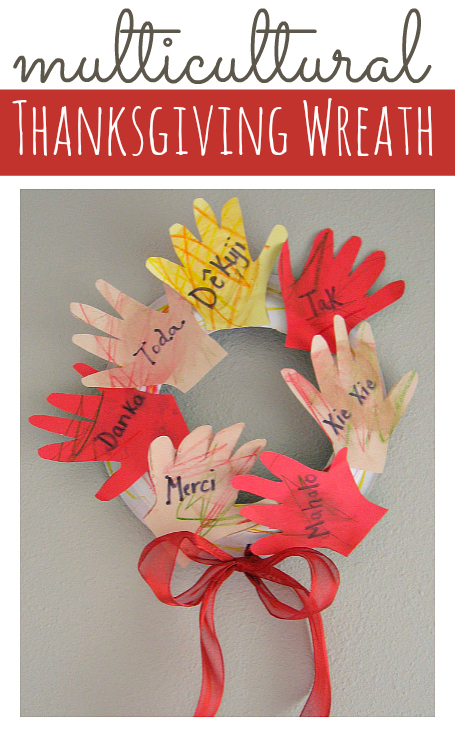
There are many cultures around the world that celebrate autumn harvest. Why not focus on the season for a craft?
Autumn:
Leaf Suncatchers

And since corn was a main food staple of the Americas, it makes sense to decorate with it.
Paper Bag Turkey

Corn Husk Dolls – On the Native Tech website there is a great story that goes along with the doll instruction if you would like to incorporate some Native American culture.

Hopefully I’ve provided you with some fun activities you can do with your children this season. However you choose to celebrate I hope you have a Happy Thanksgiving!



